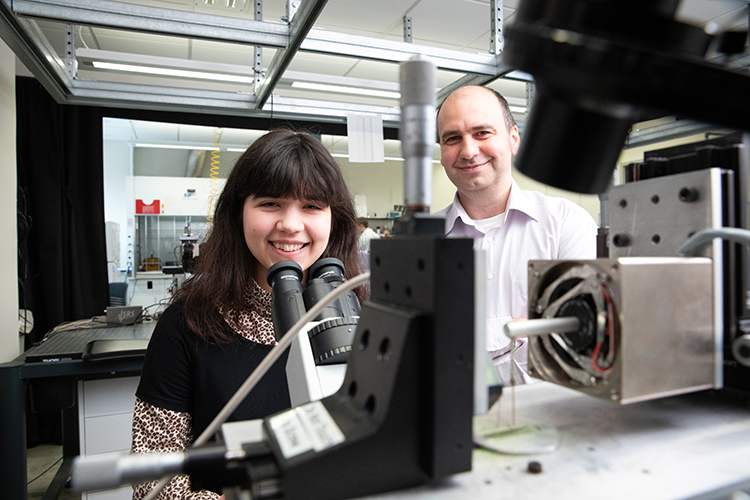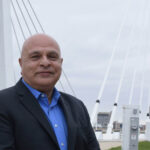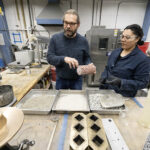Why do young people in rural areas become addicted to cigarettes, and how can this addiction be prevented?
What is a treatment that can best combat triple-negative breast cancer with fewer side effects?
What’s happening out in the universe that may change the way we understand the cosmos?
Those are just some of the undergraduate research projects the eight winners of the 2022-2023 Senior Excellence in Research award winners were involved in before graduating in May.
Alex Nelson, who earned his B.S. in biological sciences and neuroscience with honors, became a research assistant as a sophomore. He worked with Joshua Gwon, associate professor of nursing, studying how young people in rural areas become addicted to e-cigarettes and if there are ways to keep them from becoming addicted.
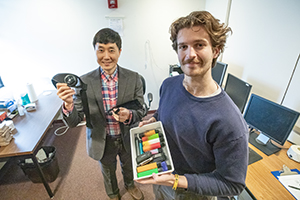
Nelson also worked with Han-Joo Lee, professor of psychology, as a lead researcher in his anxiety disorders lab. Nelson plans to combine his interest in public health and medical research by pursuing a subspecialty career in internal medicine and community health at the University of Wisconsin School of Medicine and Public Health.
Naomi Raicu, who graduated with a bachelor’s in physics, a minor in mathematics and an honors degree, worked with Ionel Popa, associate professor of physics, in his lab using fluorescence to study misfolding proteins. “Fluorescence helps us understand how proteins are folding and unfolding inside biomaterials,” she explained. Proteins are the workhorse, she added. If they misfold, the result can lead to Alzheimer’s and other conditions.
A Shorewood High School graduate, Raicu has been involved in research since high school and chose UWM because it offered the opportunity to do undergraduate research.
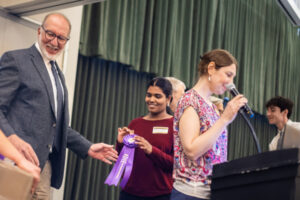
Dhivya Senthil Murugan, who graduated with a double major in neuroscience and cellular/molecular biology with a chemistry minor, liked the idea of using research to help people with medical challenges. She worked with Xiaohua Peng, associate professor of chemistry and biochemistry, studying drugs that could potentially combat hard-to-treat triple-negative breast cancer with fewer side effects.
“Research is about learning new things and trying to make the best of what you know to better people’s lives,” she said. “For me the better way to do that was through medical research and medicinal chemistry. When I first got involved, I didn’t know it was a thing. It was a very unique and enriching experience.”
Weiling Xia heard about undergraduate research in one of her classes. “I just went to the website and went through all the projects they had and ended up with research on water treatment,” said Xia, who graduated with her degree in materials science and engineering. “I was personally really interested in polymers.”
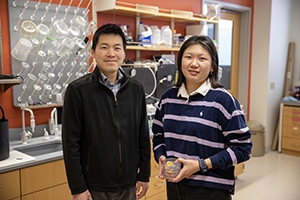
In working with Xiaoli Ma, assistant professor of materials engineering, she was able to develop research on membranes that could be used to filter contaminants out of water and treat wastewater. Her goal: “I want to be an engineer and solve problems.”
Some of the students came into the program excited about doing research as undergraduates. “Becoming involved in research has been a dream of mine since high school,” said Claire Bolda. “This really helped me explore my interest in astronomy.” She graduated with a B.S. in physics, with an emphasis on astronomy.
Her work with Dawn Erb, professor of physics, looked at how galaxies grow. “That can have important implications for our understanding of galaxies and how they’re formed,” Bolda said.
Studying pulsars to detect gravitational waves
Sparrow Roch also had the opportunity to study and research the formation of the galaxy. Roch worked with mentor Sarah Vigeland, assistant professor of physics, to study pulsars – quickly rotating neutron stars that emit beams of radiation. Timing the unique signals from pulsars at different locations in the galaxy gave researchers the opportunity to detect gravitational waves at much lower frequencies than those previously detected. Roch graduated with a double major in computer science and physics, with an emphasis on astronomy.
Marina Slawinski, who started undergraduate research before her a first year in UWM’s summer undergraduate research program, has worked on a number of projects involving biomaterials, particularly looking at materials that can be used in tissue regeneration. “That experience opened my eyes to some of the current challenges that are being worked on. That helped me discover a career direction. I’ve also been able to learn some technical skills that I wouldn’t have been able to learn in the classroom.”
She graduated with a B.S. in biomedical engineering. Her mentors were Popa and Priyatha Premnath, assistant professor of biomedical engineering.
Benefits flow both ways
Many of the students found that their research experience carried over into the classroom and vice versa.
“Initially I was able to practice what I was learning in class in the lab,” said Taylor Wilcox, who worked with Peng and Alexander (Leggy) Arnold in the lab. “Then I took what I was learning in class to come up with better scientific questions. Overall, the experience has been really good.”
Wilcox’s research focused on helping find new medications for the neuropathic pain that comes from chemotherapy and diabetic complications. She earned her degree in biochemistry and chemistry.
Writing papers and presenting at conferences also helped the students broaden their range of skills, the students all agreed.
“I think it’s really helped me with communication because you really have to learn to be concise,” Raicu said.
Throughout the year, SERA students shared their experiences with other undergraduate researchers and other students potentially interested in research.
“You can get involved in research at other schools, but people are very encouraging here,” Raicu said. “You can get involved in a field you are actually interested in. And it’s R1 and affordable. You are getting so much value for your money.”
For more information about the 2022-23 SERA award winners, see the Office of Undergraduate Research website.
